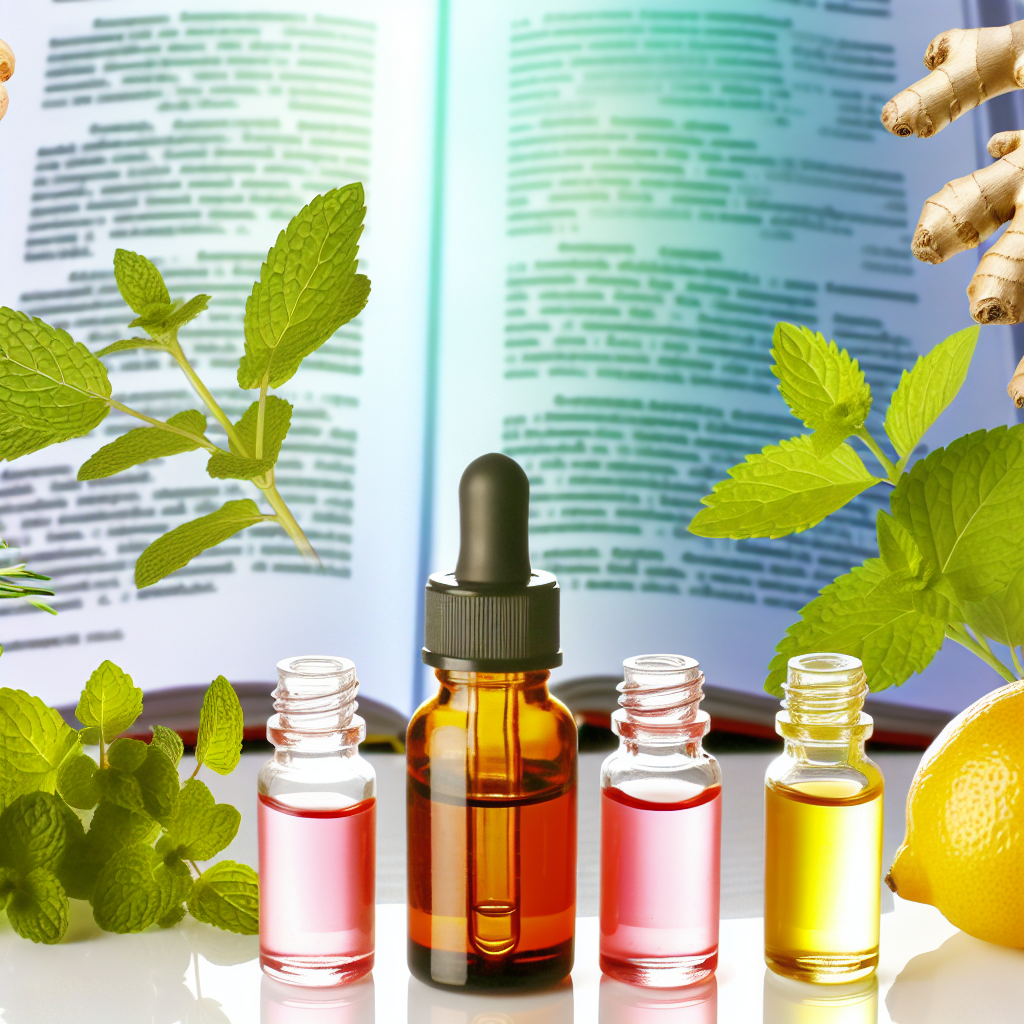Using Essential Oils as Digestive Antimicrobials: Delivery Methods for Maximum Efficacy
As gut health continues to gain traction in the wellness community, more individuals are turning to alternative therapies such as essential oils to address digestive imbalances. The gastrointestinal (GI) tract is not only responsible for digestion and nutrient absorption, but it also serves as a critical hub for immune health, metabolic regulation, and even mental wellness.
Disruptions in this intricate system—such as bacterial overgrowths, yeast imbalances, or viral infections—can lead to chronic digestive issues like bloating, gas, constipation, diarrhea, and food intolerances. Traditional treatment methods often include antibiotics, which, while effective, may contribute to long-term gut dysbiosis if overused. This has prompted both researchers and holistic health practitioners to seek natural alternatives with fewer side effects but equally robust antimicrobial properties.
Essential oils, concentrated plant extracts known for their aromatic and therapeutic benefits, are increasingly recognized for their potential antimicrobial effects within the gut microbiome. Oils such as oregano, peppermint, thyme, and clove have demonstrated significant antibacterial, antifungal, and antiviral properties in both laboratory and clinical studies.
However, due to their potency, essential oils must be administered with great caution, especially when targeting the gut. The delivery method—whether via enteric-coated capsules, microencapsulation, or emulsified formulas—plays a critical role in ensuring efficacy and safety. In this article, we explore the promising use of essential oils in digestive care and the most effective delivery systems to get them to where they’re needed most.
The Science Behind Essential Oils and Gut Health
A growing body of research supports the antimicrobial efficacy of essential oils in managing pathogenic strains within the digestive system. Among the most studied are:
– Oregano Oil: Rich in carvacrol and thymol, oregano oil has been found to disrupt bacterial cell membranes and inhibit microbial growth. A 2018 study published in *Frontiers in Microbiology* showed it to be effective against both gram-positive and gram-negative bacteria, including *E. coli* and *Staphylococcus aureus*. [Read study](https://www.frontiersin.org/articles/10.3389/fmicb.2018.02496/full)
– Peppermint Oil: Frequently used for irritable bowel syndrome (IBS), peppermint oil exerts antispasmodic and anti-inflammatory effects. A 2014 meta-analysis concluded that enteric-coated peppermint capsules significantly reduce IBS symptoms with minimal side effects. [See meta-analysis](https://journals.lww.com/jcge/FullText/2014/11000/Systematic_Review_and_Meta_analysis__Enteric_Coated.10.aspx)
– Clove Oil: Containing the active compound eugenol, clove oil possesses both antifungal and antibacterial properties. A 2021 study in *Phytotherapy Research* highlighted its ability to inhibit growth of *Candida albicans*, a yeast species commonly linked to gut dysbiosis. [Link to study](https://onlinelibrary.wiley.com/doi/full/10.1002/ptr.6105)
– Thyme Oil: Noted for its high thymol content, thyme oil has shown promising effects against multidrug-resistant bacteria and fungi. According to research in the *International Journal of Antimicrobial Agents*, thyme oil reduces microbial colonies significantly in controlled studies. [Explore research](https://doi.org/10.1016/j.ijantimicag.2006.05.032)
Delivery Strategies: Getting Essential Oils Where They Matter Most
While essential oils are powerful, their efficacy in gut health depends heavily on how they are delivered. Oral ingestion without proper formulation can lead to degraded bioactive compounds or irritation of the stomach lining. Therefore, delivery methods must ensure the oils remain potent and are released in the correct part of the digestive tract.
Here are the most science-backed options:
– Enteric-Coated Capsules
These allow essential oils to bypass the acidic environment of the stomach and reach the small intestine, where absorption is most effective. This not only improves efficacy but also reduces the risk of mucosal irritation.
– Microencapsulation Technology
This innovative method encases essential oils in biodegradable polymer shells, allowing for sustained release within the GI tract. It also improves stability and shelf life while optimizing absorption.
– Emulsification and Microemulsions
Essential oils can be pre-dispersed in carrier oils or water-based emulsions, improving solubility and absorption. This method is particularly useful when combining essential oils with other gut-supportive agents like probiotics.
– Combination Formulas with Probiotics
Some advanced formulations combine essential oils with beneficial bacteria to both suppress pathogens and repopulate the gut flora synergistically.
What to Avoid: Ineffective Delivery Routes for Gut Health
While aromatic diffusion and topical application do provide wellness benefits (like stress reduction and improved mood), they are generally ineffective for directly addressing digestive imbalances. Similarly, ingesting essential oils directly or without a carrier can be harmful. Always consult a qualified healthcare provider before incorporating essential oils into your digestive wellness routine.
Beyond the Hype: Responsible Use and Practical Guidance
Given their potency, essential oils should be approached with respect and responsibility. Always look for:
– Third-party tested supplements with transparent sourcing
– Properly dosed professional formulations
– Qualified guidance from a naturopathic doctor or integrative practitioner
Self-dosing or using undiluted essential oils can lead to side effects such as nausea, burning, or liver stress. The long-term impact of unregulated usage in vulnerable populations (e.g., pregnant individuals, children) is still under investigation.
Conclusion: Essential Oils as Part of a Holistic Gut Health Protocol
Essential oils represent a powerful, research-backed tool in the quest for better digestive health. With antimicrobial, antifungal, and anti-inflammatory properties, oils like oregano, clove, peppermint, and thyme have shown great promise in addressing gut dysbiosis.
However, their full benefits can only be harnessed through intelligent delivery—most notably enteric-coated capsules, microencapsulation, or emulsification methods. As part of a holistic digestive care plan that includes proper nutrition, stress management, and probiotics, essential oils can play a meaningful role in restoring gut balance.
With further research and refinement of delivery systems, essential oils may soon become a mainstream option in functional and integrative digestive medicine.
References
1. Leyva-López, N. et al. (2018). Essential Oils in Food Preservation: Mode of Action, Synergies, and Interactions with Food Matrix Components. *Frontiers in Microbiology*. [Read here](https://www.frontiersin.org/articles/10.3389/fmicb.2018.02496/full)
2. Alammar, N. et al. (2014). Enteric-Coated Peppermint Oil Capsules for IBS. *Journal of Clinical Gastroenterology*. [Read here](https://journals.lww.com/jcge/FullText/2014/11000/Systematic_Review_and_Meta_analysis__Enteric_Coated.10.aspx)
3. Yadav, R.K. et al. (2021). Antifungal Activity of Clove Oil. *Phytotherapy Research*. [Read here](https://onlinelibrary.wiley.com/doi/full/10.1002/ptr.6105)
4. Marchese, A. et al. (2016). Antifungal and Antibacterial Activities of Essential Oils. *Fitoterapia*. [Read here](https://doi.org/10.1016/j.fitote.2016.05.012)
5. Reuter, J. et al. (2006). Therapeutic Effects of Thyme Oil and Thymol. *International Journal of Antimicrobial Agents*. [Read here](https://doi.org/10.1016/j.ijantimicag.2006.05.032)
Summary:
Essential oils represent a powerful, research-backed tool in the quest for better digestive health. With antimicrobial, antifungal, and anti-inflammatory properties, oils like oregano, clove, peppermint, and thyme have shown great promise in addressing gut dysbiosis. However, their full benefits can only be harnessed through intelligent delivery methods like enteric-coated capsules, microencapsulation, or emulsification. As part of a holistic digestive care plan, essential oils can play a meaningful role in restoring gut balance.

Dominic E. is a passionate filmmaker navigating the exciting intersection of art and science. By day, he delves into the complexities of the human body as a full-time medical writer, meticulously translating intricate medical concepts into accessible and engaging narratives. By night, he explores the boundless realm of cinematic storytelling, crafting narratives that evoke emotion and challenge perspectives.
Film Student and Full-time Medical Writer for ContentVendor.com




